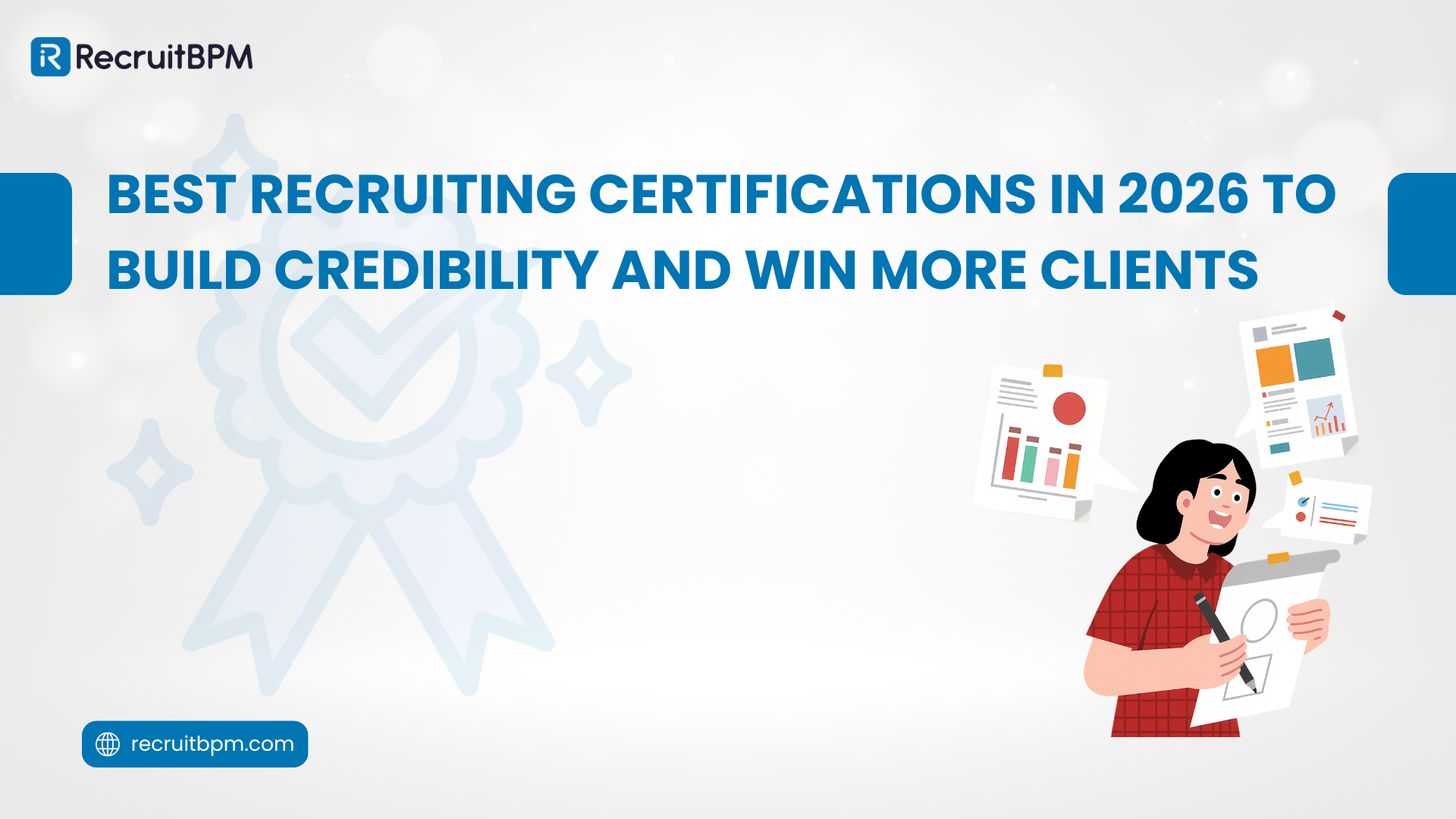Your candidates can’t see your experience. Your clients can’t verify your expertise at a glance. In a staffing industry where trust takes months to build and seconds to lose, a recognized recruiting certification closes that gap fast. SHRM-certified professionals report earning 14–15% more than non-certified peers.
Recruiters with AI credentials earn 15–30% above the market average. The credential on your profile isn’t just a badge; it’s a business development tool. This guide breaks down the best recruiting certifications in 2026, who each one is right for, and how to pick the one that actually moves your career or your agency forward.
Why Recruiting Certifications Matter More Than Ever in 2026?
The talent acquisition landscape has changed more in the last two years than in the previous decade. AI-powered sourcing, virtual hiring pipelines, and a crowded market of self-proclaimed “recruiting experts” have made it harder for clients to evaluate who they’re trusting with their most important hires.
A certification doesn’t just add letters to your LinkedIn profile. It signals to clients and candidates alike that your methods are tested, your knowledge is current, and your commitment to the craft is real. For staffing agencies, especially, it’s one of the fastest ways to differentiate your team from the competition.
The Credibility Gap Costing Staffing Agencies New Business
Here’s a problem most agency owners won’t admit: their recruiters are skilled, but they can’t prove it. Prospects compare agencies based on sales materials, referrals, and gut feeling, rarely based on verifiable professional standards.
A certified recruiter changes that conversation. When your team carries credentials from SHRM, AIRS, or AIHR, you give prospects a reason to choose you that goes beyond a pitch deck. In a competitive proposal, certification is a differentiator that costs far less than losing the account.
What Certified Professionals Earn vs. Non-Certified Peers?
The financial case for certification is straightforward. SHRM’s HR Careers Study found that certified professionals earn 14–15% more than their non-certified counterparts. Recruiters with AI-specific certifications report salary premiums of 15–30%. Certified professionals in the HR and talent acquisition field are up to 25% more likely to receive a promotion within two years of earning their credential.
For agency owners, those numbers translate directly. Higher-skilled recruiters fill roles faster, lose fewer placements, and retain clients longer, all of which compound into revenue.
What Exactly Is a Recruiting Certification?
A recruiting certification is a credential awarded by a professional institution after you demonstrate mastery of specific talent acquisition skills, knowledge, or processes. It’s not the same as completing an online course or watching a webinar series.
Most certifications require you to pass a formal examination, meet experience prerequisites, and maintain the credential through ongoing education. They carry institutional weight because they’re backed by organizations with years of industry credibility.
Certifications vs. Certificate Programs: Know the Difference
This distinction matters before you invest time and money. A certification is exam-based, requires renewal, and signals ongoing competence. A certificate program is completion-based; finish the coursework, get the certificate. Neither is inferior, but they carry different weights depending on the context.
SHRM and AIRS credentials are certifications. AIHR’s programs are certificate programs. Both are valuable, but know which one you’re buying and what your clients or employers will recognize.
How Long Do Recruiting Certifications Stay Valid?
Most recruiting certifications are valid for two to three years. AIRS certifications renew every two years, often at no cost. SHRM credentials require 60 recertification credits over three years or a retake of the exam. PHR through HRCI follows a similar three-year renewal cycle.
Plan recertification into your professional development calendar from day one. A lapsed certification does more reputational damage than having none at all.
Are Recruiting Certifications Worth It for Staffing Agency Professionals?
Yes, but context matters. A certification amplifies skills you already have. It won’t make a poor recruiter good, but it will make a capable recruiter significantly more competitive, more credible, and more promotable.
When Certification Pays Off for Agency Recruiters?
Certification delivers the highest ROI in three situations. First, when you’re new to talent acquisition and need to establish credibility without years of placement history. Second, when you’re pitching enterprise clients who require proof of professional standards before signing. Third, when you’re expanding into a new vertical, such as executive search, tech recruiting, or healthcare staffing, specialized credentials signal genuine expertise.
For agency owners building a team, certifying two or three senior recruiters creates a firm-level credibility signal that shows up in proposals, on your website, and in client conversations.
When a Certification Alone Won’t Move the Needle?
A certification without strong recruiting fundamentals is a credential without a foundation. If your pipeline management is weak, your candidate communication is slow, or your ATS workflow is disorganized, adding letters after your name won’t fix the underlying gaps.
Think of certification as the complement to solid operational practice, not a substitute for it. The strongest agencies pair certified talent with the right technology stack to execute at scale.
Top Recruiting Certifications in 2026 (By Role and Goal)
Choosing the right certification depends on your role, your vertical, and what you need the credential to do for your career or business.
SHRM Talent Acquisition Specialty Credential Best for In-House TA Teams
The SHRM Talent Acquisition Specialty Credential is the go-to for corporate and internal recruiting professionals who want a globally recognized credential that speaks directly to structured hiring practices. It covers the full talent acquisition lifecycle from job requisition through onboarding, alignment with modules on candidate experience, compliance, and virtual hiring.
SHRM carries significant brand recognition with HR leaders and CHROs. If you work closely with HRBP teams or report to a VP of HR, this credential speaks their language. It earns SHRM PDCs toward broader SHRM-CP or SHRM-SCP recertification, making it a smart investment for long-term career development.
AIRS Professional Recruiter Certification (PRC) Best for Agency Recruiters
The AIRS Professional Recruiter Certification (PRC) is the most widely recognized credential for agency recruiters and full-desk professionals. It covers the complete recruitment cycle, strategic planning, candidate sourcing, pipeline management, interviewing, and stakeholder communication. Available in both instructor-led and self-guided formats, it’s practical and accessible for working recruiters.
AIRS certifications renew every two years, often at no cost. The AIRS ecosystem also includes specialized credentials for technical recruiting, diversity and inclusion, and social media sourcing, making it the most flexible certification family for agency teams that serve multiple verticals.
AIHR Sourcing & Recruitment Certificate Best for Data-Driven Hiring
The AIHR Sourcing & Recruitment Certificate is a comprehensive certificate program designed for talent acquisition professionals who want to strengthen their analytical foundation. It covers sourcing strategy, candidate experience design, and data-driven hiring decision-making, and it earns both SHRM PDCs and HRCI credits upon completion.
This program is best suited for recruiters moving into senior or operational roles, those shaping how hiring works across an organization, not just filling individual requisitions. It’s particularly valuable for TA professionals inside growing staffing firms who need to systematize and scale their processes.
NAPS Certified Personnel Consultant (CPC) Best for Direct-Hire Staffing
The NAPS Certified Personnel Consultant (CPC) credential is specifically designed for staffing professionals who place candidates in direct-hire roles. It focuses on employment law, legal compliance, ethical recruiting practice, and stakeholder management areas that matter significantly when you’re placing candidates who will become permanent employees.
NAPS also offers the Certified Temporary Staffing Specialist (CTS) for agencies focused on contract and temp placements. Both credentials carry weight with enterprise clients who need assurance that their staffing partners understand legal and compliance risk.
AI Recruiter Certifications You Can’t Ignore in 2026
Artificial intelligence has moved from a nice-to-have to a core operating tool for talent acquisition teams. The recruiters who understand how to use AI for sourcing, screening, and pipeline management are filling roles faster and managing more requisitions simultaneously.
Why AI Literacy Is Now a Core Talent Acquisition Skill?
AI tools aren’t replacing recruiters; they’re replacing recruiters who don’t know how to use AI. Agencies leveraging AI-powered sourcing can process candidate pools in minutes that would take days manually. Recruiters who understand prompt engineering, AI screening logic, and automation workflows are dramatically more productive than those who don’t.
Clients and employers are beginning to screen for AI fluency the same way they once screened for ATS proficiency. A formal AI credential signals that your skills are current and that you can lead your team’s technology adoption, not follow it.
Top AI-Focused Certifications for Recruiters This Year
The AIRS Certified AI Sourcing Recruiter (CASR) is the most structured AI certification currently available for recruiting professionals. It covers AI-powered sourcing, generative AI tools, custom GPT applications for talent search, and AI-driven job description optimization. The program runs 20–30 hours and costs $995, with SHRM and HRCI credit backing its credibility.
AIHR’s broader digital HR programs also cover AI in talent acquisition as part of their curriculum. For agencies on a tighter budget, hireEZ’s free Recruiting Academy offers practical AI sourcing training with no cost barrier, a strong starting point before investing in a formal credential.
How to Choose the Right Certification for Your Recruiting Role?
Not every certification is right for every recruiter. Choosing based on your role type and business model gets you far better ROI than chasing the most well-known name.
Staffing Agency vs. Corporate Recruiter: Different Goals, Different Certs
Agency recruiters operate in a business development context. Their certifications need to impress clients, signal professionalism in proposals, and demonstrate expertise across industries and role types. AIRS PRC and NAPS CPC are built for this environment; they’re recognized by the clients you’re trying to win.
Corporate and internal TA teams operate in an employee advocacy context. Their credentials need to resonate with HR leadership, legal teams, and hiring managers. SHRM’s Talent Acquisition Specialty Credential and AIHR’s certificate programs are designed for this environment; they’re structured around process, compliance, and candidate experience.
Executive Search and Niche Verticals: Specialized Credentials That Win
If you operate in executive search, technical recruiting, or a specialized vertical like healthcare or legal staffing, general credentials are only the starting point. AIRS offers the Certified Technical Recruiter (CTR) for IT and engineering-focused recruiters, and the Certified Diversity and Inclusion Recruiter (CDR) for agencies building DEI-forward talent practices.
For executive search professionals, the Cornell University Recruiting and Talent Acquisition certificate program, an 80-hour, university-backed credential, carries weight with C-suite clients who recognize institutional names. It’s a strong investment for principals and partners who want to reinforce their strategic positioning.
How the Right Technology Amplifies Your Certification’s Value?
A certified recruiter working in a fragmented, manual workflow is like a licensed contractor working without tools. The credential validates your knowledge. The platform determines how far that knowledge actually reaches.
Certified Skills Need a Platform That Matches Their Depth
Your AIRS certification teaches you to build strategic candidate pipelines. Your AIHR certificate teaches you to make data-driven hiring decisions. Neither skill delivers its full value if your ATS can’t track pipeline stages, your CRM isn’t connected to your candidate database, and your reporting is a manual spreadsheet.
The gap between what certified recruiters know and what their tools allow them to do is one of the most overlooked problems in staffing agencies. Fragmented tech stacks force certified professionals to work below their capability, which costs placements, slows time-to-fill, and frustrates the hiring managers you’re trying to impress.
How RecruitBPM Helps Certified Recruiters Execute at Full Capacity?
RecruitBPM is a unified ATS and CRM platform built specifically for staffing agencies, recruiting firms, and executive search professionals. Your AIRS-trained pipeline management skills map directly to RecruitBPM’s candidate tracking and workflow automation features. Your AIHR-trained data analysis skills connect directly to built-in reporting and placement analytics.
Where most agencies run three or four disconnected tools, one for tracking candidates, one for managing clients, one for job board posting, and one for back-office operations, RecruitBPM consolidates everything into a single platform. Certified recruiters stop spending time on manual data entry and tool-switching. They spend that time doing what their certifications trained them to do: building relationships, identifying talent, and closing placements.
At $89 per user per month with access to 5,000+ job board integrations and AI-powered sourcing tools, RecruitBPM gives your certified team the operational infrastructure to match their professional credentials.
Ready to see how it works? Book a live demo and bring your toughest workflow challenges. We’ll show you exactly how the platform handles them.
Frequently Asked Questions About Recruiting Certifications
Which Recruiting Certification Is Best for Beginners?
The best recruiting certification for beginners is the AIRS Professional Recruiter Certification (PRC) or the HRCI Associate Professional in Human Resources (aPHR). Both are accessible without years of experience, structured around foundational recruiting concepts, and recognized across the industry. AIRS PRC is the stronger choice for agency recruiters; aPHR is better for those entering corporate HR or internal TA roles.
Can I Get a Recruiting Certification Online?
Yes. Most of the leading recruiting certifications in 2026 offer fully online formats. AIRS offers both self-guided and instructor-led online options. AIHR’s certificate programs are entirely online and self-paced. SHRM’s Talent Acquisition Specialty Credential includes eLearning modules with an online knowledge assessment. A few programs, like Cornell’s certificate, include live virtual sessions via Zoom alongside recorded coursework.
Do Clients and Hiring Managers Actually Notice Certifications?
In competitive agency pitches and senior-level searches, yes, certifications are noticed and valued. Enterprise clients who manage multiple vendor relationships often use professional credentials as a baseline filter for credibility. Hiring managers at large organizations increasingly expect talent acquisition partners to demonstrate structured, verifiable expertise rather than anecdotal experience.
That said, certification is one factor among many. A certified recruiter who communicates poorly and misses deadlines will still lose the client. Think of certification as the door-opener; your performance keeps it open.
The Bottom Line on Recruiting Certifications in 2026
The recruiting certifications worth pursuing in 2026 are the ones tied directly to your role, your clients, and your growth goals. AIRS PRC for agency credibility. SHRM Talent Acquisition for corporate TA depth. AIHR for a data-driven hiring strategy. NAPS CPC for compliance-conscious direct-hire staffing. And an AI credential, CASR, or equivalent for every recruiter who wants to stay relevant in a technology-driven market.
Certification without execution is just a badge. Combine your credentials with a platform that gives your skills room to operate, and you build an agency that clients trust, candidates respect, and competitors can’t easily replicate.

















